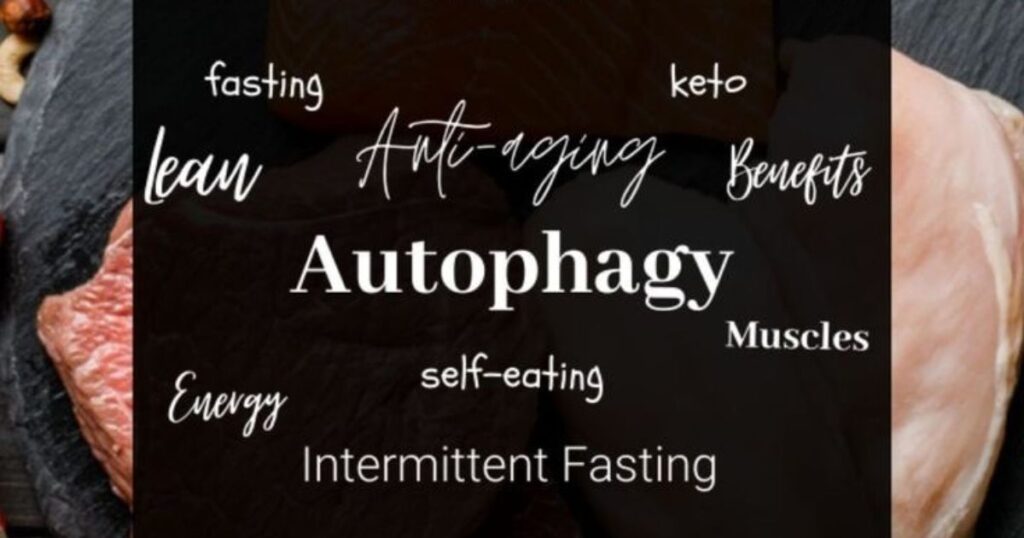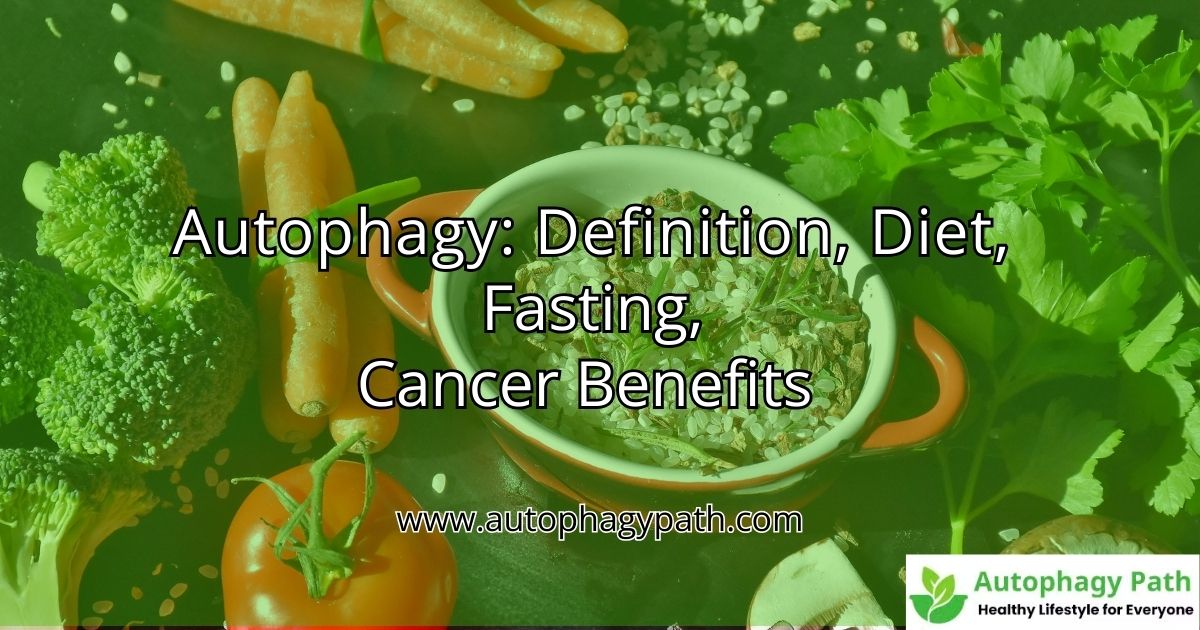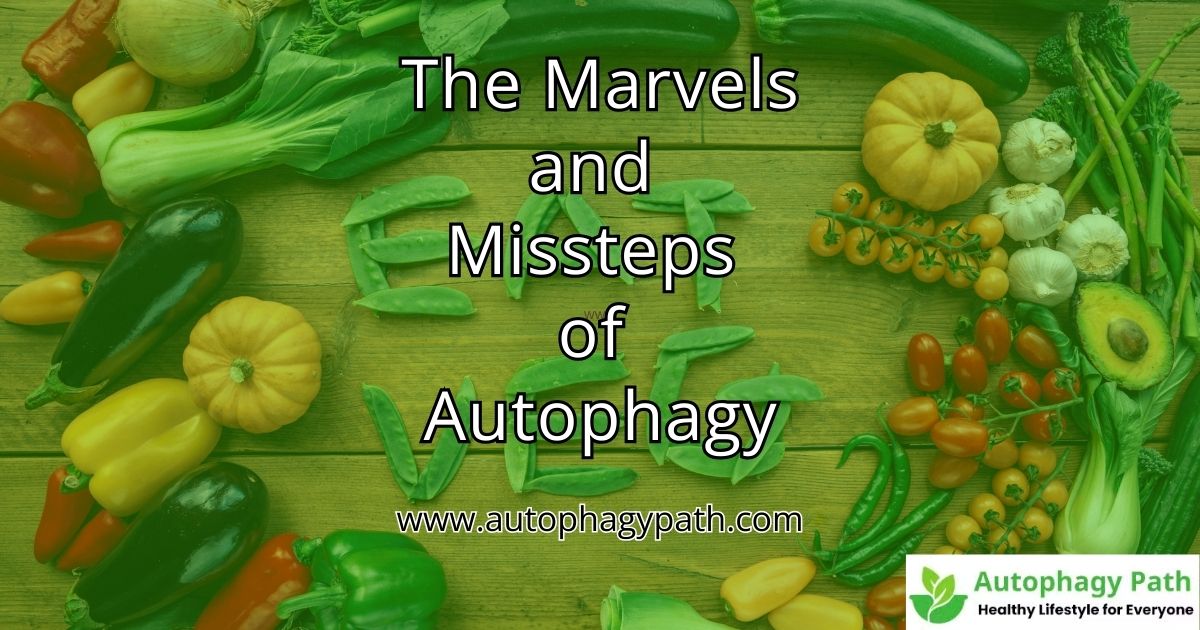Benefits of Autophagy for Cancer Patients
What is Autophagy?
Autophagy definition in Greek is self-eating. Diet, Fasting, and prevention of Cancer Benefits are included in it. It is a self-healing process at the cellular level. Here, you can discover Autophagy: Definition, Diet, Fasting, Cancer Benefits. The cellular self-healing secrets that can alter health perspectives for better life longevity can also be explored through this post.
Read more: Benefits of Autophagy for Cancer PatientsThis self-cleaning mechanism is essential for maintaining cellular health and homeostasis.
Within our cells, autophagy acts as a quality control system, identifying and removing old or faulty proteins, damaged organelles like mitochondria, and other cellular debris.
By recycling these components, autophagy contributes to cellular rejuvenation and overall organismal health.

What’s in this Blog Post?
Autophagy Diet
The relationship between autophagy and diet is a topic of significant interest in health and wellness industries. Several dietary factors can influence autophagy positively or negatively.
- Nutrient-Dense Foods: Consuming a diet rich in nutrient-dense foods such as fruits, vegetables, whole grains, healthy fats like omega-3 fatty acids, and lean proteins can support autophagy. These foods provide essential vitamins, minerals, antioxidants, and phytonutrients that promote cellular health and enhance the efficiency of the autophagic process.
- Caloric Restriction: Caloric restriction, without malnutrition, has been shown to stimulate autophagy. It becomes possible through strategies like intermittent fasting or time-restricted eating, where periods of reduced calorie intake get interspersed with regular eating patterns. During fasting or reduced caloric intake, cellular energy sensors like AMP-activated protein kinase (AMPK) and sirtuins get activated for increased autophagic activity.
- Avoiding Excessive Sugars and Processed Foods: High consumption of sugars, refined sugars, and processed foods impairs autophagy. These dietary choices can lead to cellular stress, inflammation, and insulin resistance, which may negatively impact autophagic processes.
Autophagy Fasting
Fasting is a potent physiological stimulus for autophagy.
When we abstain from food for extended periods, our cells undergo metabolic changes that trigger autophagy as a survival mechanism.
Here are some points about autophagy and fasting
- Intermittent Fasting: This popular fasting method involves alternating periods of eating and fasting. Regular intermittent fasting protocols include the 16/8 method (fasting for 16 hours and eating within an 8-hour window) or the 5:2 diet (eating for five days and restricting calorie intake on two non-consecutive days). Studies have shown intermittent fasting can enhance autophagy, leading to cellular cleanup and renewal.
- Extended Fasting: Longer fasting periods, such as 24-hour or multi-day fasts, can further promote autophagy. During extended fasting, sources of cellular energy stores get depleted, prompting cells to recycle damaged components and optimize energy utilization. However, fasting should be approached cautiously and under medical supervision, especially for individuals with specific health conditions.
- Autophagy in Different Tissues: It is important to note that autophagy may vary in different tissues and organs during fasting. For instance, the liver and muscle cells may experience increased autophagic activity to release stored energy, while brain cells may rely on alternative mechanisms to maintain essential functions.
Prevention and treatment have garnered considerable attention in scientific research. While the relationship between autophagy and cancer is complex and context-dependent, even then, have several potential benefits, which are as follows:
- Cellular Quality Control: Autophagy helps maintain cellular integrity by removing damaged organelles and proteins that could otherwise contribute to cellular dysfunction and genomic instability associated with cancer development.
- Metabolic Regulation: Autophagy plays a role in regulating cellular metabolism, including processes like glucose and lipid metabolism. Dysregulated metabolism is a hallmark of cancer cells, and promoting healthy metabolic pathways through autophagy may help prevent tumor formation.
- Immune System Modulation: Autophagy influences immune responses, which include the clearance of intracellular pathogens and the presentation of antigens to immune cells. A robust immune system supported by optimal autophagic activity can aid in detecting and eliminating cancerous cells.
- Therapeutic Potential: Targeting autophagy therapeutics has emerged as a potential strategy in cancer therapy. Modulating autophagic pathways in combination with other treatment modalities like chemotherapy or immunotherapy shows promise in enhancing treatment efficacy and overcoming drug resistance.
However, it is essential to note that autophagy’s role in cancer is multifaceted, and its effects may vary depending on the cancer type, stage, and microenvironment.
Further research is needed to fully understand the complexities of autophagy in cancer biology and therapy.
Let us delve deeper into the intricate workings of autophagy, exploring its regulation, the role of exercise, and its implications beyond cancer.

Regulation of Autophagy
Autophagy is a finely regulated process that involves a complex interplay of molecular signals and cellular pathways. The key regulators of autophagy include:
- mTOR Pathway: The mammalian target of rapamycin (mTOR) pathway is a central regulator of cellular growth and metabolism. When mTOR activity is high, it suppresses autophagy. In contrast, nutrient deprivation or energy stress inhibits mTOR, leading to the activation of autophagic pathways. This link between nutrient sensing and autophagy underscores the importance of metabolic balance in cellular homeostasis.
- AMPK Activation: AMP-activated protein kinase (AMPK) is a cellular energy sensor that becomes activated during conditions of low energy availability, such as fasting or exercise. AMPK activation promotes autophagy by phosphorylating targets involved in autophagy initiation.
- Autophagy-Related Genes (ATGs): A set of genes known as autophagy-related genes (ATGs) encode proteins that orchestrate the different stages of autophagy, including autophagosome formation, cargo recognition, and lysosomal degradation. Modulating the expression or activity of ATGs can profoundly impact autophagic flux and cellular health.
Understanding the regulatory mechanisms of autophagy provides insights into how various interventions, such as dietary modifications and physical activity, can modulate this process for health benefits.
The Role of Exercise in Autophagy
Physical exercise is not only beneficial for cardiovascular fitness and muscular strength but also exerts profound effects on cellular processes like autophagy.
Here’s how exercise influences autophagy:
- Mitochondrial Quality Control: Exercise promotes mitochondrial biogenesis and turnover, a process known as mitophagy. Mitochondria are crucial energy-producing organelles, and maintaining their quality through mitophagy is essential for cellular energy balance and resilience.
- Muscle Adaptations: During exercise, skeletal muscle changes dynamic to meet increased energy demands. Autophagy in muscle cells helps remove damaged proteins and organelles, contributing to muscle repair, adaptation, and overall performance.
- Brain Health: Regular exercise is associated with cognitive benefits and neuroprotection. Autophagy in brain cells plays a role in clearing protein aggregates, reducing neuroinflammation, and supporting neuronal survival, which is relevant to conditions like Alzheimer’s and Parkinson’s.
- Metabolic Benefits: Exercise-induced autophagy contributes to metabolic flexibility, improving insulin sensitivity, glucose utilization, and lipid metabolism. These metabolic adaptations are crucial for maintaining metabolic health and reducing the risk of metabolic disorders like type 2 diabetes.
The type, intensity, and duration of exercise can influence the magnitude of autophagic responses.
Aerobic exercise (e.g., jogging, cycling) resistance training (weightlifting), ketogenic diet stimulate autophagy in different tissues, highlighting the importance of incorporating diverse forms of physical activity for overall health.
Autophagy – Cancer Benefits and Beyond
While much attention has focused on autophagy’s role in cancer, its relevance extends to various age-related diseases and conditions:
- Aging Process: Autophagy declines with age, contributing to cellular senescence, accumulation of damaged molecules, and impaired tissue function. Strategies that enhance autophagy, such as caloric restriction or pharmacological interventions, have been proposed as potential anti-aging interventions to promote healthy aging and longevity.
- Neurodegenerative Disorders: Autophagy dysfunction is visible in neurodegenerative diseases like Alzheimer’s, Parkinson’s, and Huntington’s diseases. Enhancing autophagic clearance of protein aggregates, such as amyloid-beta and tau in Alzheimer’s disease, is a therapeutic target under investigation.
- Cardiovascular Health: Autophagy plays a protective role in cardiovascular health by removing dysfunctional organelles, reducing oxidative stress, and regulating lipid metabolism. Dysregulated autophagy is associated with deteriorating health conditions like atherosclerosis, heart failure, and cardiac hypertrophy.
- Metabolic Disorders: Autophagy influences metabolic homeostasis and insulin sensitivity, making it relevant to metabolic disorders such as obesity, type 2 diabetes, and fatty liver disease. Promoting autophagy through lifestyle interventions or pharmaceutical agents may offer therapeutic benefits in managing these conditions.

By understanding the broader implications of autophagy in aging and disease, researchers are exploring novel strategies to modulate autophagic pathways for preventive and therapeutic purposes.
The duration of fasting required to stimulate autophagy can vary depending on several factors, which include individual metabolism, age, sex, activity level, and overall health status. Autophagy typically begins to increase after a certain fasting period, as the body transitions from using glucose as its primary energy source to utilizing stored energy reserves, such as glycogen and fat. Autophagy typically begins after approximately 12-16 hours of fasting.
When your body enters a state of autophagy, several cellular processes and metabolic changes occur to support cellular health, adaptation, and survival. Autophagy, often called the cellular recycling or self-cleaning process, plays a crucial role in maintaining cellular homeostasis, removing damaged components, and optimizing cellular function.
Autophagy can have potential risks such as excessive cellular degradation and tissue damage. While autophagy is generally considered a beneficial process that supports cellular health and homeostasis, there are other potential risks or complications associated with autophagy under certain conditions or contexts. It is important to recognize that autophagy’s effects can vary depending upon factors such as the type of cells involved, the duration and intensity of autophagic activity, and the overall physiological state of the organism
Autophagy, in simple words, is like a cleaning process that happens inside our cells. Just as we clean our homes to remove old or broken items, our cells have a mechanism to clean up damaged or unnecessary parts. During autophagy, the cell creates small structures called autophagosomes that act like garbage bags, collecting and breaking down old proteins, malfunctioning parts of cells, or other waste materials. These autophagosomes then fuse with special compartments called lysosomes, which contain enzymes that digest and recycle the waste, turning it into new building blocks that the cell can use for energy or to make new components. Essentially, autophagy helps cells stay healthy by getting rid of junk and ensuring everything runs smoothly.
Conclusion
Autophagy is a fundamental process that extends far beyond its initial characterization in cellular maintenance and cancer biology.
From dietary influences and fasting adaptations to exercise-induced responses and implications in aging and disease, autophagy emerges as a central player in optimizing cellular function and overall health.
As scientific advancements move ahead to unravel the complexities of autophagy regulation and its multifaceted roles, opportunities arise for innovative interventions and personalized health strategies.
Whether harnessing the benefits of nutrient-rich diets, embracing diverse forms of physical activity, or exploring targeted therapies that modulate autophagic pathways, the potential for improving human health through autophagy remains vast and promising.
As we navigate the intricate landscape of cellular self-regulation and adaptation, let’s remain curious, informed, and proactive in leveraging the power of autophagy for a healthier, more resilient future.
Final Thoughts
Here are limitless positive results that get attributed to autophagy, as far as the acquisition of various optimal health benefits is concerned.
The day-to-day scientific research behind this sacred traditional wisdom is the evidence and becomes one of the tools of trustworthiness of this noble science.
The significant assistance by Mother Nature in the human body for everyone who intends to adopt this lifestyle functioning at the cellular level is openable and undeniable.
The sequences of multiple health benefits offered through AUTOPHAGY are inconclusive and unexhaustive.
However, it becomes evident to recognize that the day is not far away for a person who began his Journey to reap the bounty of enjoying life without pain, illness, and squeezing youthful energy levels one more time in his life, despite the challenges and adversities that throws by life at him.







